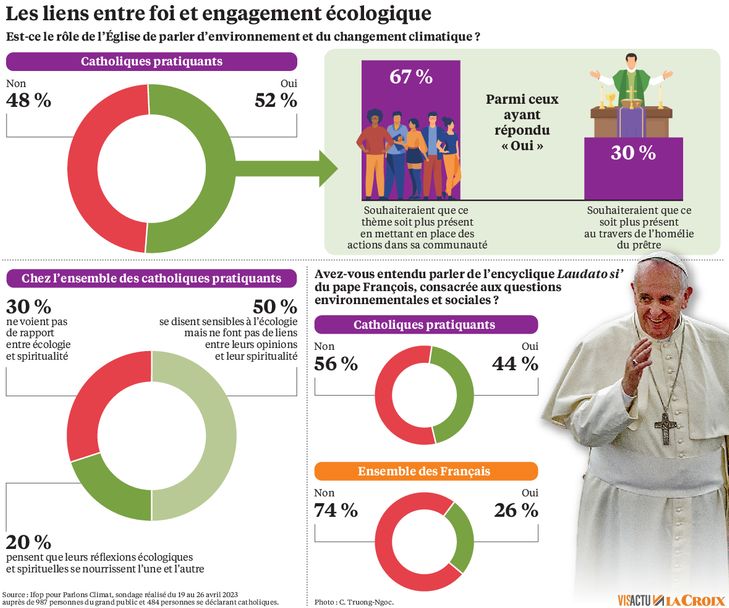How do Catholics position themselves in the face of the ecological crisis? Are they ready to shake up their way of life? What do they expect from the Church on these issues? It is on the basis of these questions that the associations Parlons climat and A Rocha have launched, with Ifop, a vast study (1) whose The cross publishes the results exclusively. It reveals that the French presenting themselves as “practicing Catholics” are more committed than average to ecology.
Thus, 71% of these Catholics say they have supported or participated in climate marches, compared to 65% for all French people. They are also 14% to have already participated in a local ecological mobilization, against 7% on average. Lastly, 85% are convinced that we need “radical and immediate changes” to combat climate change.
A specific commitment
This specific commitment of Catholics to ecology appears directly linked to regular attendance at Mass. Among respondents who present themselves as practicing Catholics, “the group most reluctant to ecology is the one who practices the least”says Gauthier Simon, a political science researcher who participated in the study.
“Religious practice is predictive of significant militant commitment among Catholics”, confirms researcher Cléo Schweyer (2). For example, studies have long shown the overrepresentation of Catholics in centrist parties. From now on, “sociologists are surprised to find in radical ecological groupsa strong presence of people brought up in Catholicism,” comments Gauthier Simon, whose thesis focuses on ecological conversion. This remarkable presence would be explained in particular by the “predispositions” to commitment that Catholic socialization would favor: scout life from a young age, greater investment in voluntary activities…
A commitment unrelated to faith
More surprisingly, this particular Catholic tropism for ecology seems to have little to do with faith itself. The study reveals that 56% of people presenting themselves as “practicing Catholics” have never heard of the encyclical Laudato si’of Pope Francis dedicated to safeguarding the ” commune house “. And only 20% of these Catholics indicate that their “Ecological and spiritual reflections feed each other”. Half of the panel (50%) say they are sensitive to ecology but do not “no links” between his opinions and his spirituality. The remaining 30% simply do not see “no report” between ecology and spirituality.

According to Gauthier Simon, this would confirm the hypothesis that it is an education, a socialization specific to Catholics and an influence of their often wealthy social background that would push them to act for the planet, much more than a spiritual journey. He recalls that the true appropriation of ecology by the institution dates from Pope Francis, and is therefore extremely recent. The researcher encourages us to read this survey as a “photograph” of an ongoing process: the slow appropriation by the Church and the faithful of ecology.
An underrepresented mass
The relationship of Catholics to these questions is therefore complex. If they are convinced of the existence of climate change and of the need to act, they view with great suspicion certain actors or environmental discourse. Even the most committed among them have “tendency to see ecology as a competing religion”, notes Gauthier Simon. In short, if their education and their social position predispose Catholics to commit themselves to ecology, the link with their faith is not always obvious for them, and ecology also seems to come into contradiction with a form of Christian anthropocentrism.
Behind these major trends are obviously fractures. These are particularly strong when one evokes the possible duty of positioning of the Church. One out of two practicing Catholics considers that it is the role of the institution to talk about climate change. Conversely, 37% of Catholics think that Christians talk too much about ecology and that there are more important subjects. The survey thus shows that Catholics are more concerned about immigration and insecurity than the rest of the population.
Three standard profiles
To better understand the complexity of this relationship between Catholics and ecology, the researchers associated with the study identified three typical profiles. So many robot portraits that illustrate the sometimes irreconcilable positions that fracture the ecclesial landscape today. One of these profiles “the ambivalent committed” – 27% of the panel – embodies the specificity of Catholics in the face of ecology. This woman in her thirties goes to mass very regularly and supports the marches for the climate (82%). If she thinks that biblical values promote ecological commitment, she also considers that we should not put an equal sign between humanity and the rest of Creation.
The other two profiles are further away from the institution. Representing 29% of the panel, the “disengaged conservative” is a sixty-year-old right-winger and very little practicing. He only supported 20% of the marches for the climate, and believes that it is not up to the Church to talk about ecology. Finally, the majority profile, that of “the eco-Catholic in retreat”, 44% of the sample, stands out for individual rather than collective spiritual practice and strong support for climate marches. Ultimate paradox, he is the one who, despite his distance from the institution, expects the most from the Church to position itself and support the environmental movement.
—-
The Challenge of Surveying Catholics
Understanding Catholics in an increasingly secularized society is a challenge that pollsters often face. This study chose to survey people who spontaneously define themselves as “practicing Catholics”.
Broader than the categories distinguishing the faithful according to their degree of practice, this method makes it possible to gather the point of view of cultural Catholics, who willingly present themselves as Christians but have very few links with the institution and a sometimes weak spiritual life.
For this survey conducted in April 2023, Ifop questioned a group of 484 “practicing Catholics” as well as a representative sample of the French population made up of 987 people, using the quota method.
—-
EXCLUSIVE – Ecology: for 85% of Catholics, “radical changes” are needed

